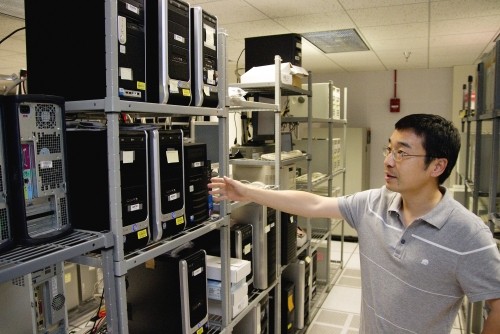Every day millions of people are uploading, texting and sharing information online, but consider where and how this information is being stored. Codelucida, a startup largely based on research done at the UA, has developed an innovative technology to enhance the efficiency and reliability of data storage products.
According to the Department of Energy, there are 3 million data centers in the U.S., which adds up to about one center for every 100 people. These centers are continually processing and storing information and constantly using an exorbitant amount of energy. In order to serve their needs, Codelucida is in the process of using recent investment to fund commercial scale distribution of their error-correction technology.
The company was recently funded $700,000 to market this data storage technology by angel investment groups, including Tucson’s Desert Angels, Tech Coast Angels and Arizona’s Tech Investors. This adds to their previous funding of $900,000 from the National Science Foundation.
The technology behind Codelucida was originally researched by its co-founders during their doctoral studies. The company’s chief scientific officer, Bane Vasic, is a professor of electrical and computer engineering at the UA. Shiva Planjery, Codelucida CEO, received his doctorate in electrical engineering from the UA and another from the University of Cergy-Pontoise, France. David Decler, chief technology officer, is a professor at the ENSEA university in Cergy-Pontoise, France.
Codelucida’s technology uses coding to correct the errors that occur in flash memory drives while also reducing their silicon footprint.
“The system architect designs the code to catch and rectify errors and anomalies in the system, like in [the film] ‘The Matrix.’” Vasic explained. “The code runs behind the scenes and the decoder present[s] correct data to the user despite the many, many errors that actually happen.”
RELATED: Competition tasks students to program better self-driving cars
Once they completed their research it was then a matter of getting their product into industry. Tech Launch Arizona is an office at the UA that helps patent, license and commercialize intellectual property originating from scientific research done at the UA.
TLA’s Tech Transfer Arizona office provides services to faculty members hoping to commercialize their work. “Basically, researchers and faculty here come up with inventions, they tell our office about those inventions, we work with them and outside attorneys to get protected and then we look for ways to commercialize that invention; and a percentage of the cases, those inventors want to create a company around that technology,” said Tech Transfer Arizona senior director Doug Hockstad.
TLA, along with Arizona Center of Innovation, has been working with Codelucida to patent and market their technology for viable, widespread use.
“They have a strong team,” said Joann MacMaster, business development director for TLA. “They have strong intellectual property, they have good market opportunity and they have interest from early stage customers.” Vasic echoed MacMaster’s opinion.
“We are currently talking with potential customers, big companies that make storage systems and hopefully soon we will start customization of our chip to their needs,” Vasic said.
RELATED: UA researcher snags Air Force grant for transistors
The market demand for a product that stores data efficiently is growing fast. Correction of the vast amounts of errors that occur within these data centers consumes a great deal of energy.
Without improvement, Vasic estimated that by 2020 America will require 17 new power plants just for data centers.
According to IBM, humans are producing 2.5 quintillion bytes of data every day and 90 percent of it has been created in the last two years. This stresses the importance of energy-efficient data storage on a large, industrial scale.
“You want to make sure that you understand that the focus is not on the technology,” Planjery said. “You want to focus on the problem you’re trying to solve in the market. The technology is only the means to solve that problem.”
Students and graduates of the UA who are interested in, or have ideas for, creating problem-solving technology or starting up their own business have many accessible resources at their disposal.
Hockstad recommends that students take advantage of the resources that are available to them.
“Tech Launch is a resource that is available to them to help them go down that path of commercializing that tech and starting a company and if it doesn’t cost them anything, it’s hugely valuable,” Hockstad said.
Follow Serena Conde on Twitter.









